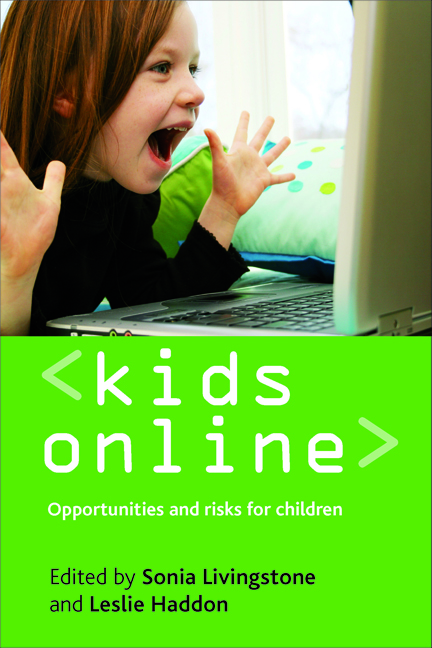Book contents
- Frontmatter
- Contents
- Notes on contributors
- Acknowledgements
- one Introduction
- Section I Researching European children online
- Section II Going online: new opportunities?
- Section III Going online: new risks?
- Section IV Policy implications
- Appendix A List of country codes
- Appendix B Children and parents online, by country
- Appendix C The EU Kids Online network
eighteen - Media literacy
Published online by Cambridge University Press: 15 July 2022
- Frontmatter
- Contents
- Notes on contributors
- Acknowledgements
- one Introduction
- Section I Researching European children online
- Section II Going online: new opportunities?
- Section III Going online: new risks?
- Section IV Policy implications
- Appendix A List of country codes
- Appendix B Children and parents online, by country
- Appendix C The EU Kids Online network
Summary
Introduction
Across Europe and beyond, the promotion of media literacy for both children and adults has acquired an important public urgency. Traditional literacy is no longer seen to be sufficient for participation in today's society. Citizens need to be media literate, it is claimed, to enable them to cope more effectively with the flood of information in today's highly mediated societies. As teachers, politicians and policy makers everywhere struggle with this rapid shift in media culture, greater responsibility is placed on citizens for their own welfare in the new media environment. Media literacy is therefore all the more essential in enabling citizens to make sense of the opportunities available to them and to be alerted to the risks involved.
How media literacy might be achieved is the subject of this chapter, and three main themes are addressed. First, we examine how media literacy has been defined with particular reference to the growing importance of digital literacy. Second, we examine how media literacy has been adopted within policy frameworks as a response to rapid technological change. Third, we critique the ‘technological literacy’ that dominates much of the current policy agenda (Hasebrink et al, 2007), and argue for a new approach based on better knowledge about children and young people's media and internet habits.
Defining media literacy
The debate about what media literacy means is a long-standing one. It is frequently acknowledged as a good thing, although we are not always agreed on what it is (O’Neill and Barnes, 2008). A growing consensus around its key conceptual parameters is emerging with the definition ‘the ability to access, understand and create communications in a variety of contexts’ (Livingstone, 2004: 5; CEC, 2007a: 6). Drawing on Aufderheide (1997), the objective of media literacy, so defined, is a ‘critical autonomy relationship to all media’, organised around a set of common beliefs or precepts recognising that the media are constructed and that they have commercial, ideological and political implications. Digital literacy is one of a host of new literacies (Coiro et al, 2007), including computer or technological literacy associated with the information society (CEC, 2009) that now join the debate on the need for media literacy.
- Type
- Chapter
- Information
- Kids OnlineOpportunities and Risks for Children, pp. 229 - 240Publisher: Bristol University PressPrint publication year: 2009



